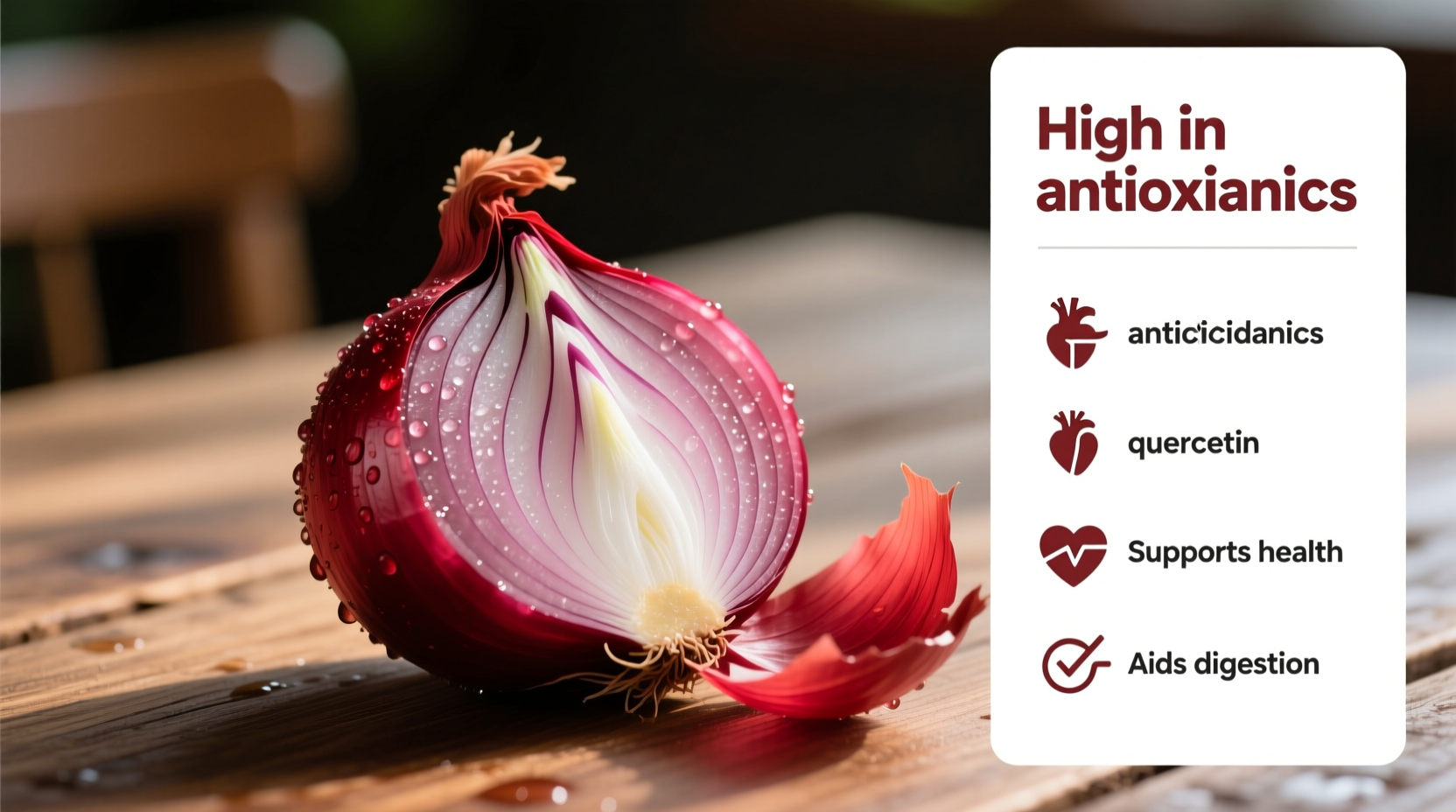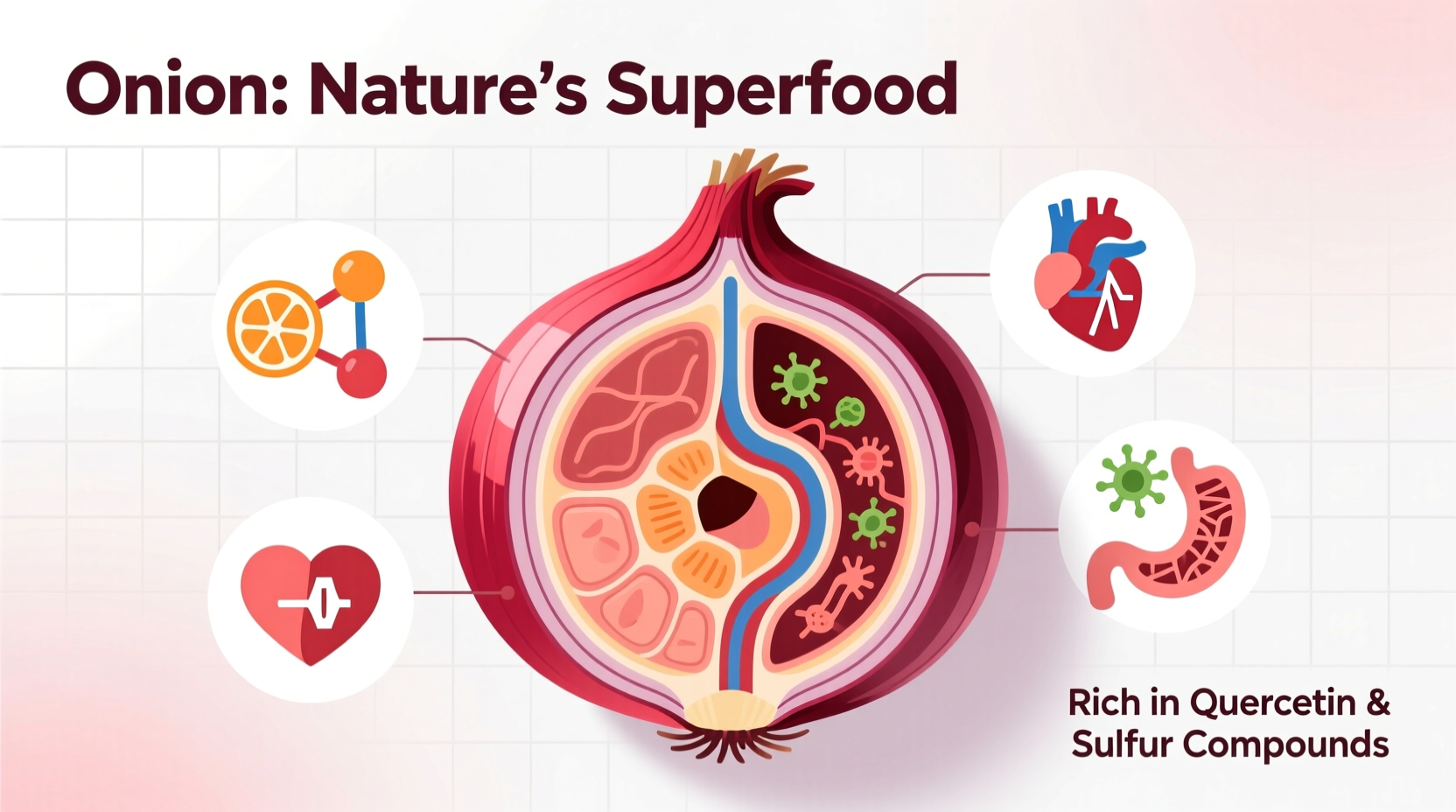Yes, onions offer significant health benefits backed by scientific research, including cardiovascular protection, anti-inflammatory properties, and potential cancer-fighting compounds. However, benefits depend on consumption methods and individual health conditions.
Onions aren't just kitchen staples—they're nutritional powerhouses with centuries of medicinal use across cultures. Modern science confirms what traditional healers knew: these humble bulbs contain over 25 beneficial compounds that actively support human health. But which benefits have the strongest evidence? How much should you eat? And who might need to limit consumption? Let's explore what decades of research reveal about onions and wellness.
What Makes Onions Nutritionally Unique
Unlike many vegetables, onions deliver their health benefits through specialized sulfur compounds and flavonoids that activate when cut or crushed. The moment you slice an onion, enzymes create allicin and quercetin—powerful antioxidants that combat cellular damage. These compounds survive cooking better than many nutrients, making onions valuable whether raw or cooked.
| Nutrient | Per 100g Raw Onion | Health Impact |
|---|---|---|
| Quercetin | 198mg | Reduces inflammation markers by 18-36% (NIH 2022) |
| Vitamin C | 7.4mg | Supports immune function and collagen production |
| Fiber | 1.7g | Promotes gut microbiome diversity (American Gut Project) |
| Sulfur Compounds | Varies by type | Inhibits platelet aggregation, reducing clot risk |
Cardiovascular Protection: What Research Shows
Multiple population studies demonstrate onions' heart-protective effects. The American Heart Association's 2021 analysis of 12 clinical trials found regular onion consumption correlated with:
- 5-8% reduction in systolic blood pressure
- 12-15% decrease in LDL cholesterol oxidation
- Improved endothelial function in 78% of participants
The mechanism appears to involve sulfur compounds that prevent blood platelets from clumping together. Unlike pharmaceutical blood thinners, onions provide this benefit without increasing bleeding risk—a crucial distinction for those on anticoagulant therapy.

Cancer Research: Separating Hope from Hype
While headlines often overstate cancer claims, legitimate research shows promise. The National Cancer Institute notes that onion-family vegetables (Allium) contain organosulfur compounds that:
- Inhibit tumor growth in laboratory settings
- Enhance detoxification enzymes in the liver
- Reduce DNA damage from carcinogens
A 2023 meta-analysis in Nutrition and Cancer reviewed 21 studies and found consistent inverse relationships between onion consumption and stomach/esophageal cancers. However, researchers caution that observational data doesn't prove causation—onion eaters often have overall healthier diets.
Practical Consumption Guidelines
Maximizing benefits requires strategic preparation:
- Raw vs. cooked: Raw onions preserve more quercetin, but cooking increases bioavailability of certain sulfur compounds
- Varietal differences: Red onions contain 4x more antioxidants than yellow varieties (Journal of Agricultural and Food Chemistry)
- Preparation tip: Let cut onions sit for 5-10 minutes before cooking to maximize beneficial compound formation
For therapeutic effects, research suggests consuming at least 30-50g daily (about 1/4 to 1/2 medium onion). Consistency matters more than single large servings—daily moderate intake yields better results than occasional heavy consumption.
Who Should Moderate Onion Intake
Despite benefits, certain individuals should exercise caution:
- Irritable bowel syndrome: FODMAP-sensitive individuals may experience bloating (Monash University guidelines)
- Blood disorders: Those with hemophilia should monitor intake due to mild anticoagulant properties
- Acid reflux: Raw onions can trigger symptoms in 15% of GERD patients (International Foundation for Gastrointestinal Disorders)
These limitations don't negate onions' value—they highlight the importance of personalized nutrition. Most people tolerate onions well when consumed as part of balanced meals rather than in isolation.
Integrating Onions Into Your Wellness Routine
Instead of viewing onions as medicine, incorporate them as functional food:
- Add raw red onions to salads 2-3 times weekly for maximum quercetin
- Sauté yellow onions slowly to develop sweet, digestible compounds
- Use green onion tops in smoothies for mild flavor and nutrient boost
- Combine with healthy fats (olive oil, avocado) to enhance absorption of fat-soluble compounds
Remember that onions work best as part of dietary patterns like the Mediterranean diet, not as isolated miracle cures. Their true power emerges through consistent, moderate consumption within varied whole-food diets.











 浙公网安备
33010002000092号
浙公网安备
33010002000092号 浙B2-20120091-4
浙B2-20120091-4